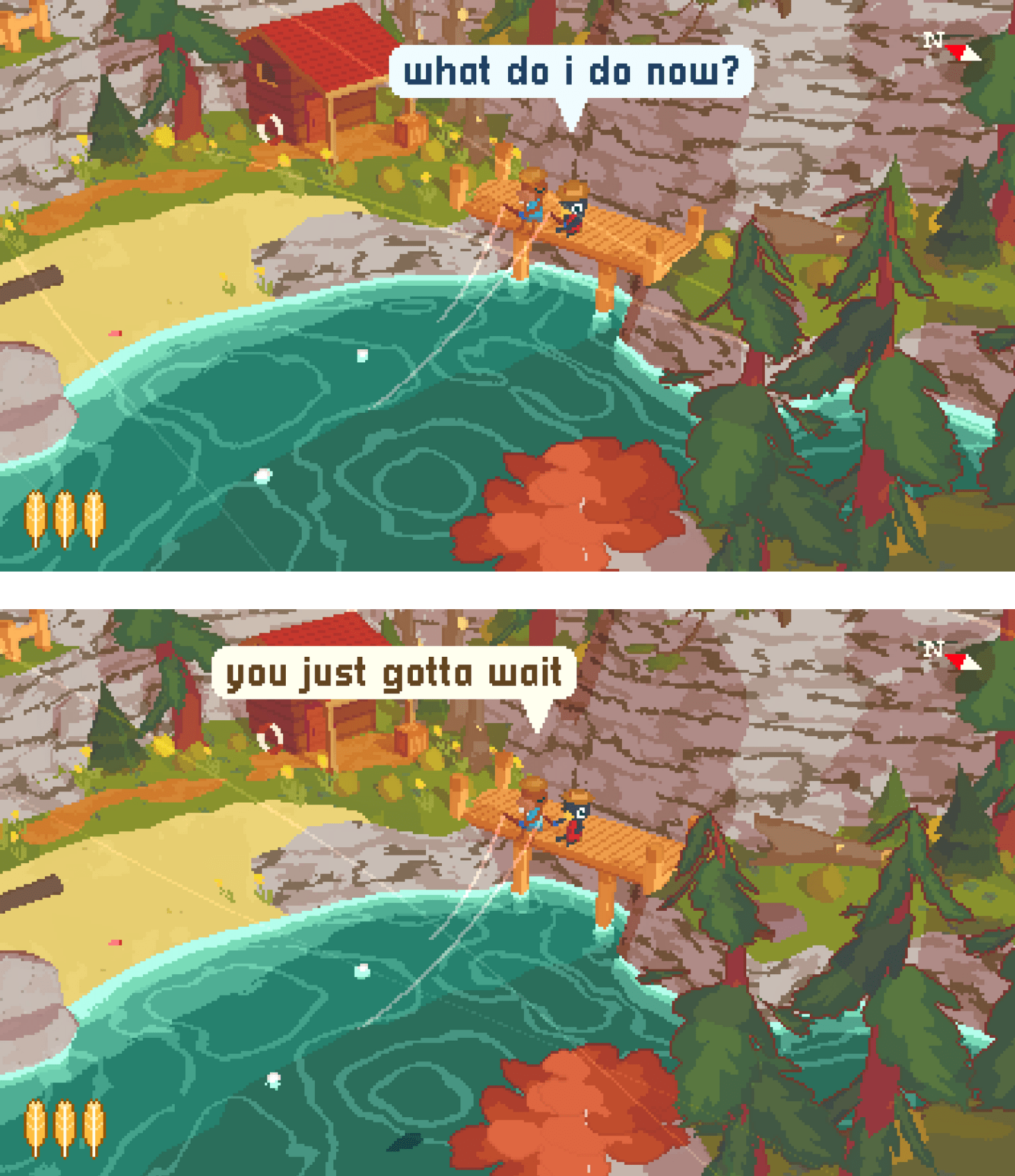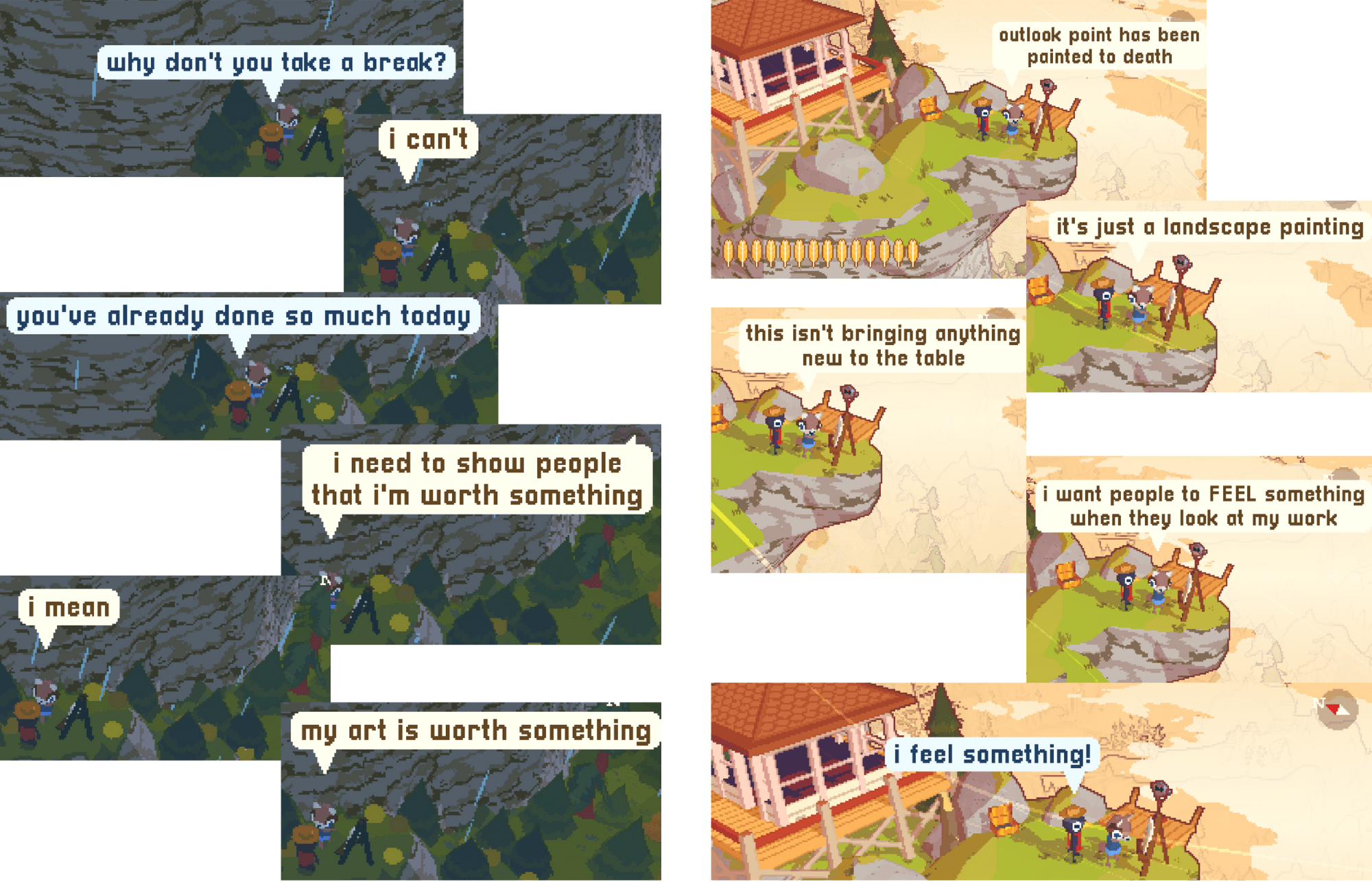I’ve always felt dissuaded from purchasing “Short and Sweet” games. Why buy a 10-hour experience over a 100-hour one for the same price? Though I’ve been repeatedly recommended A Short Hike, the ratio of cost vs. playtime always acted as a barrier against purchasing it… but the ability to analyze it (and it being on sale) was sufficient motivation to change my mind. While I played under 5 hours, I 100%’d the game—not out of obligation, but sheer desire to exhaustively explore the game’s wonderful world; I regret having waited so long, as I know A Short Hike affected me well beyond its playtime.
Published in 2019 by indie developer Adam Robinson-Yu, A Short Hike is an adventure game suitable for all ages. Currently available on PC, Xbox, Playstation, and Switch, I played on PC. In a world of anthropomorphic animals, one plays as Claire, a bird spending summer away from her city hometown at Hawk Peak Provincial Park, an island. The game applies Embedded Narration by providing minimal story elements—that is, until you explore.
The game reveals Claire and other island-goers’ stories only as one explores. By interacting with the first character encountered, one learns that Claire is waiting for a phone call, but the park has only 1 location with reception: the top of Hawk Peak. What the call is for and what the hike entails is uncertain. Without walking/exploring, one will neither discover more, nor reach Hawk Peak. While exploring, one experiences neither set explorational ordering, mandated pace, nor restrictive storyline. Walking and exploration represent an essential part of discovery in A Short Hike; walking (or generally moving) exposes physical barriers one may face in life, while the game’s explorational dialogue highlights intangible barriers. United, A Short Hike exhibits how each individual has their own mountain to overcome, but that we aren’t alone in our journeys.
Before leaving, one learns that Claire has spent the summer at the park, but still hasn’t climbed Hawk Peak. The dialogue’s delivery presents the first case of an intangible barrier: Claire lacked motivation to climb Hawk Peak, until her desire to gain reception.

Further interactions with island-goers introduce movement mechanics, including gliding, jumping, and climbing, which require Golden Feathers, a stamina-resource. Claire starts unable to climb a small cliff, lacking Golden Feathers. This dynamically forces the player to explore and/or talk with characters to discover where to obtain one. As the player learns they’ll need a minimum of six feathers to climb Hawk Peak, they might initially try obtaining six as fast as possible—but with the physically pleasing movement, calming music. and unique people one encounters, one might quickly find their motivations shifting towards fun through submission and slow their journey simply to enjoy the world (such as by fishing).


By walking, exploring, and slowing down, the player learns that with enough support from other characters (whose interactions and storylines lead to Golden Feathers), Claire can overcome the physical barrier the mountain presents. Simultaneously, Claire encounters characters with their own intangible barriers. By following their storylines, despite not being mandatory, the player can support them, and the realize that Hawk’s Peak isn’t the only mountainous barrier the game showcases.


A Short Hike’s best discoveries are optional; they’ll only be experienced by players actively exploring. The exception: Hawk Peak itself. While acting as a physical obstacle, most who explored intricately will find climbing the mountain easier than expected—that the support (of Golden Feathers) from individuals and experience gained from exploring was ample to overcome the Peak. Once climbed, one finally learns why Claire’s desire for reception was motivation enough to climb the Peak: HOVER TO REVEAL MAJOR SPOILER.

By making deep exploration and storylines optional but rewarding, A Short Hike emphasizes that you must decide how to enjoy your life. Using movement as a means of overcoming physical barriers, and explorational dialogue to represent non-physical barriers, A Short Hike portrays how each individual has their own mountain to overcome, but that we aren’t alone in our climb… once we choose to interact with others. A Short Hike was aesthetically wonderful, thematically potent, and an utter joy to play. While I wish it hadn’t taken me so long to overcome the barrier to purchase the game, I’m glad that my motivation eventually arrived.



